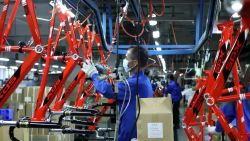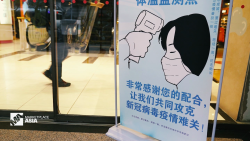China said Friday it will temporarily reduce tariffs on imports of American-made cars as it tries to negotiate a trade deal with the United States.
Citing the meeting earlier this month between US President Donald Trump and Chinese leader Xi Jinping, the Chinese Finance Ministry said in a statement that it will remove the additional 25% tariffs on car imports from the United States for three months starting January 1. That will bringChina’s tariffs on American-made cars to 15%, in line with those for cars made in other countries.
China also said it would suspend its 5% tariff on 67 other auto parts.
China imposed the additional tariffs on US cars in July and on some auto parts in September as part of its retaliation in the trade war between the two countries.
At their meeting in Argentina, Trump and Xi agreed to a temporary truce while they try to negotiate a broad trade deal over the next 90 days.
In its statement Friday, the Finance Ministry described the decision to remove the tariffs as a “concrete action” aimed at helping to bring about a “mutually beneficial new Sino-US trade order.”
Xi pledged in April that China would cut tariffs on imported cars this year. His government delivered on that promise in July, reducing import taxes from 25% to 15%.
But just days later, China imposed new additional tariffs of 25% on American-made passenger vehicles as the trade war with the United States escalated.
The tariffs hurt profits of major automakers that ship cars to China from the United States. Germany’s BMW and Daimler, the owner of Mercedes-Benz, have been hit particularly hard. Shares of BMW (BMWYY) and Daimler (DDAIF) both trimmed early Friday losses on the news.
The stocks had spiked last week after Trump tweeted that China was going to cut auto tariffs.
General Motors (GM) and some other automakers already have a large presence in China through partnerships with local manufacturers. It has become the largest and most important market for the American auto industry. Because their plants are in the country, they weren’t subject to big import taxes.
Yet China’s tariffs have hurt exports from US auto plants. The value of US passenger car exports to China has fallen by $2.4 billion, or 30%, over the course of the first nine months of the year.
Part of that could be because of slowing Chinese auto sales. Yet overall sales of American cars in China -— including those made in China — are down only about 1% so far this year.
In a statement on Friday, Ford said it was “very encouraged by China’s announcement.” “We applaud both governments for working together constructively to reduce trade barriers and open markets.”
Eric Cheung and David Goldman contributed to this report.


























